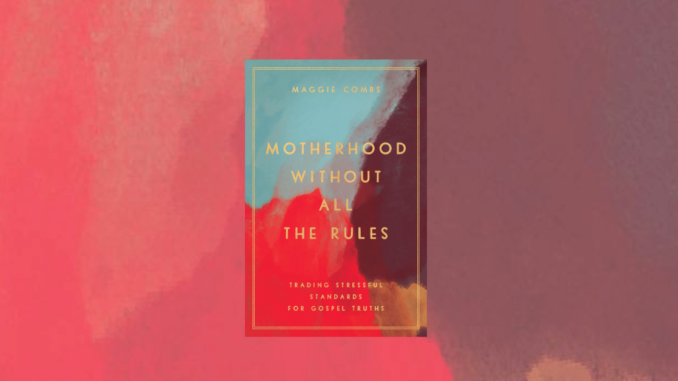
Published by Moody Publishers on September 1, 2020
Genres: Non-Fiction, Christian Life, Marriage, Memoir, Parenting
Goodreads

Ditch Pressure for Freedom in Christ
Any mom who has tried to create a godly home for her family knows it doesn’t happen automatically. Through books, blogs, and Instagram accounts, culture asserts that good moms must follow certain standards and abide by certain rules if she want what’s best for her children. She must do everything she can—and she must do it all just right.
Following the suggested steps and recommended rules may seem best, but what if we’re missing the point? This is something Maggie Combs came to realize while seeking to be a good mom to her three sons. Though the world around us may have critical expectations and rules for mothering, Christ instead calls moms to an intimate, abiding relationship with a triune God. In Motherhood Without All the Rules, Maggie identifies the main “rules” moms today often feel pressured to follow and counters them with gospel truth. You’ll discover how the character of each member of the trinity practically impacts your role as a mom. Join Maggie in forgetting the rules, so that instead of being a good mom, you grow to become a holy mom.
Motherhood without all the Rules is full of wisdom and encouragement for Christians moms who are struggling with comparison, judgment, and a sense of defeat. Maggie Combs pushes back against unhealthy standards in secular culture and within the church, helping her readers focus on gospel truths instead of the lie that they must always do enough, be enough, and love themselves enough to be effective and worthy. Coombs also offers great advice for how to treat your children with dignity and love them as your closest neighbors, instead of treating them as vehicles for self-fulfillment. Although she respects her children’s privacy and does not write about their sin struggles in detail, she shows how she has grown over time in dealing with discipline issues that she perceives as personal attacks. This chapter was one of my favorites, and is full of realistic, clear-eyed wisdom.
However, Motherhood Without All the Rules does not focus on communal judgment to the degree that I hoped it would. Combs writes about an experience with external pressure, admitting that she used to feed her children organic snacks in public and regular snacks at home, but she focuses on the spiritual and emotional elements of this without addressing how people can change negative societal patterns. I wish that she had spent more time addressing how people can navigate disagreement in a charitable way, cope with criticism of their choices, and evaluate when they are judging others. Even though this is a great guide for dealing with internal struggles, someone who is expecting guidance on how to end mom judgment in their church or circle of friends may find this disappointing.
Mothers in Different Situations
Combs keeps her book inclusive to single mothers, stay-at-home moms, working moms, and those who juggle childcare while working from home. However, even though she makes an effort to be inclusive and not overlook anyone, she does make a significant assumption about her married readers. In the chapter where she takes on the stressful standard that “Mom and Dad have to be on the same page,” she tells her readers that even when they and their husbands disagree on lifestyle and parenting issues, they can cherish their unity in Christ, knowing that they both love Jesus and want to glorify God with their families.
This encouragement will apply to many of her readers, but it shocked me that she made no provision for women in mixed-faith marriages. Many mothers deal with stress over belief conflicts in their household, especially when their husband is critical of their faith or disparages their efforts to share it with their children. This isn’t the author’s experience, which is a blessing for her, but I wish that she had acknowledged this source of pain in some people’s lives, instead of leaving off on a positive note about a type of unity that some people may never see in their marriages.
However, even though that disappointed me, I still enjoyed the rest of the chapter. I appreciate her message about listening to your husband and working as a team, instead of assuming that because you are the mother, you are always the expert. She pushes back against near-universal social messages here, encouraging mothers to be humble instead of assuming that it is their job to guilt or nag their husbands into the types of parenting approaches that they prefer.
Conclusion
Maggie Combs writes with an honest sense of everyone’s sinfulness and human frailty. Instead of elevating women as the ones who must always be perfect and right, she encourages mothers to let go of legalism, acknowledge their failures, and find wholeness in Christ. This book is full of encouraging gospel reflections and practical advice for family life, and even though I had slightly different expectations for this book and wish that Coombs had acknowledged readers who lack spiritual support from their husbands, I appreciate the perspective that she offers. Many parenting books put even greater burdens on their readers, telling them that they are responsible to make every change, fix their families, and perfect themselves, but this book takes pressure off Christian women by allowing them to stop placing their identity in parental achievement, see how God sustains them, and cling closer to Him through the everyday grind of parenting.
